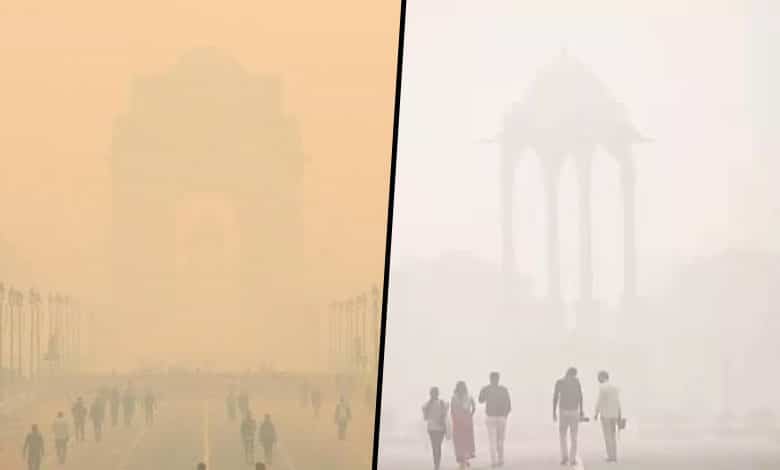Delhi Air Quality Crisis: Is It Time to Relocate the National Capital?
As Delhi grapples with its worst-ever air pollution crisis, Congress MP Shashi Tharoor’s provocative question on social media has sparked a nationwide debate on whether the national capital is still fit to serve as the administrative hub of India.

Hyderabad: As Delhi grapples with its worst-ever air pollution crisis, Congress MP Shashi Tharoor’s provocative question on social media has sparked a nationwide debate on whether the national capital is still fit to serve as the administrative hub of India. With the Air Quality Index (AQI) reaching hazardous levels and smog choking the city, Tharoor’s tweet—asking if Delhi should even remain the capital—has gained significant traction, with many suggesting a shift to cleaner southern cities like Chennai or Hyderabad.
Table of Contents
Tharoor, a Member of Parliament from Thiruvananthapuram, posted on X (formerly Twitter), “Delhi is officially the most polluted city in the world, 4x hazardous levels and nearly five times as bad as the second most polluted city, Dhaka. This city is essentially uninhabitable from November to January inclusive and barely livable the rest of the year. Should it even remain the nation’s capital?” His tweet has sparked a wider conversation about the future of Delhi, especially as it faces recurring smog and severe air pollution levels each winter.
Also Read: Delhi’s Air Quality Hits Alarming Levels: Equivalent to Smoking 50 Cigarettes a Day
Indonesia’s Capital Shift: A Precedent for Delhi?
While Tharoor’s tweet has raised eyebrows, it also brings to light a growing trend seen in other parts of the world. In 2022, Indonesia made headlines when it passed legislation to move its capital from Jakarta, notorious for its air pollution and sinking land, to a new city named Nusantara on the island of Borneo. Jakarta, with a population of 10 million, has been facing severe air quality issues and flooding due to rising sea levels and groundwater depletion. The move to Nusantara is set to be completed by 2045, at an estimated cost of $35 billion (Rs 2.905 lakh crore). It will also involve relocating up to 1.9 million people to the new capital.
The Indonesian government’s decision to relocate its capital was driven primarily by Jakarta’s worsening environmental issues, including severe air pollution, land subsidence, and the threat of flooding due to rising sea levels. In fact, Jakarta has been ranked among the world’s most polluted cities and is sinking at an alarming rate—one-third of the city could be submerged by 2050. The shift to Nusantara, located about 1,000 km from Jakarta, is part of a broader vision for a sustainable and environmentally friendly capital that will prioritize green energy and urban planning.

Delhi’s Air Quality Crisis: A Growing Concern
Back in Delhi, the situation is no less dire. As pollution levels soar during the winter months, residents of the capital face acute health risks from hazardous smog, which is exacerbated by a combination of vehicular emissions, crop residue burning in neighboring states, and industrial pollutants. In 2023, Delhi ranked as the most polluted city globally, with AQI readings often crossing the 400 marks, indicating severe health risks. On November 19, 2024, Delhi’s AQI stood at a hazardous 492, underlining the urgent need for long-term solutions to air pollution.
Also Read: Delhi Schools Closed Due to Pollution, Online Classes for All Except Class 10 and 12 Students
During the winter months, Delhi experiences a spike in respiratory illnesses, with hospitals seeing a surge in patients suffering from conditions like asthma, bronchitis, and other respiratory disorders. Children and the elderly are particularly vulnerable to the effects of air pollution, with many residents finding it difficult to breathe due to the thick haze that often blankets the city.

Shashi Tharoor’s Call for Action
Tharoor’s comments resonate with many who have long called for stronger measures to tackle Delhi’s air pollution problem. “Delhi’s air is essentially uninhabitable during the winter months,” Tharoor said in his tweet. His comments come just days before the Winter session of Parliament is set to begin, with MPs from across India set to converge in New Delhi.
The Congress leader also pointed out that Delhi’s air quality is not only hazardous to its residents but has global implications, as it continues to top lists of the most polluted cities in the world. Tharoor’s call for action has also prompted discussions about whether a capital shift—similar to Indonesia’s—is something India should consider, especially given the state of environmental concerns in Delhi.
What’s Next for Delhi’s Pollution Crisis?
While a capital shift may be an extreme and unprecedented solution, experts are calling for urgent policy changes and long-term strategies to address Delhi’s pollution crisis. Measures such as stricter enforcement of pollution control regulations, better waste management, improved public transportation, and stricter penalties for crop burning are essential in combating the city’s deteriorating air quality.
As the debate continues, one thing is clear—Delhi’s air quality issue is not only a local concern but a national one that requires immediate and sustained action. Whether or not India will follow Indonesia’s lead in shifting its capital remains to be seen, but Tharoor’s tweet has certainly put the spotlight on Delhi’s pollution crisis and the need for urgent reform.
With global concerns about climate change and environmental sustainability growing, the question of whether Delhi can continue to serve as India’s capital amidst its pollution woes is one that will likely continue to spark discussion and debate in the years to come.
